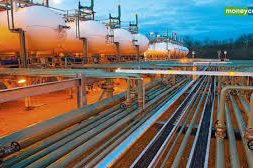
New Delhi: UK supermajor BP plc chief executive Bob Dudley on Monday said there are 100 trillion cubic feet of yet-to-be-discovered natural gas reserves in India that would be enough to meet half of the nation’s gas demand till 2050.
BP in partnership with Reliance Industries is investing about USD 5 billion to bring about 1 billion cubic feet a day of new domestic gas onstream beginning mid-2020, he said.
Also, the company is expanding the partnership into fuel retailing that will entail scaling up RIL’s present network of 1,400 petrol pumps to 5,500 by 2023. These pumps, besides retailing petrol and diesel, would also have electric vehicle charging facility, he said.
“India has a great opportunity with gas too, the ideal partner for renewables, which are intermittent by nature,” he said at the India Energy Forum of CERAWeek here. “I believe that there is close to 100 Tcf of natural gas resources yet to be found below ground here in India. That in itself can meet half of the natural gas demand out to 2050.”
But exploitation of gas reserves will depend a lot on how the economics works out as developing the resources in the deepsea does not come cheap, he said emphasising on economic pricing of natural gas.
“It’s going to take a lot of exploration and will require economics to be right. It’s expensive deeper offshore, but once you get the networks and the pipelines in place, India is going to need every fuel it can get,” he said. “You need to do whatever you can do to replace coal with clean natural gas, and that will reduce emissions. And you can use India’s gas instead of buying expensive LNG (from abroad).”
India, he said, has the right policy framework of providing a higher cap price for natural gas produced from difficult areas such as deepsea.
“We have USD 5 billion worth of projects coming onstream next May, and we would like to be able to sell gas in an open market to our customers as well as our own companies … if that happens there will be more development,” he said.
The government mandates a cap price based on alternate fuels for gas from difficult areas, which for the October 2019 to March 2020 period is USD 8.43 per million British thermal unit, more than double the USD 3.23 per mmBtu rate for other domestic gas.
He said the USD 4 per mmBtu price of imported liquefied natural gas (LNG) in “no way converts for the cost” of the fuel. It is a “distress price,” he said as he sought to discourage using rate prevalent in spot or current LNG market to price domestically produced natural gas.
“India also has the right resources above and below ground. It has relationships in place to maximise those resources. And it has a responsible policy in place to enable those relationships to run effectively and efficiently.”
Dudley said his optimism also comes from the work BP is doing with its partner Reliance Industries. The partners have recently acquired one more block, and the existing asset is rearing to produce more.
“I am very optimistic about the joint venture we are forming with Reliance on the (fuel) retail market. We will bring all types of new things, electrification, mobility, bringing convenience marketing together with Reliance has 1400 stations today and hitting over 5,500 stations across India. There will be great growth rates regarding fuel in India.”
Dudley, who retires early next year, said India “has just experienced its fastest rate of energy consumption for more than a decade. And on current trends, it will be more than double from today’s levels by 2040.”
Upbeat about BP’s relations in India, he said: “The USD 1 billion Green Growth Equity Fund we manage with partners in India will support the Indian government’s plans to increase renewable capacity to 450 GW over the next few years.”
“So, the resources are available; the relationships are in place, which leaves policy. And it’s here where India scores a hat-trick,” he added.












